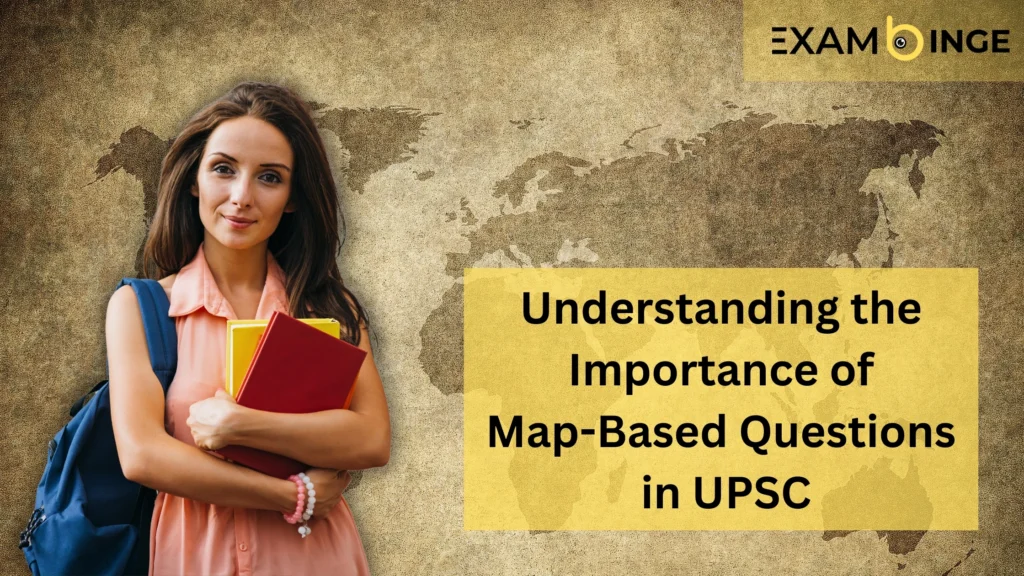When preparing for the UPSC Civil Services Exam, aspirants often focus on mastering theoretical knowledge, but one essential yet frequently overlooked aspect is map-based questions. These questions are an integral part of both the Prelims and Mains exams and play a significant role in boosting your scores. In this blog, we will discuss the importance of map-based questions in UPSC, the role maps play in various subjects, and how you can prepare effectively for them.
Why are Map-Based Questions Important in UPSC?
Maps offer a visual representation of geographical, political, and environmental concepts that are vital for the UPSC exam. Understanding the importance of map-based questions can significantly enhance your exam preparation strategy. Here’s why map-based questions hold such significance:
- Enhance Visual Learning and Retention: Maps help candidates visualize geographical locations, boundaries, and physical features, making it easier to recall during the exam. This visual representation can help you retain complex information, such as the location of mountain ranges, rivers, and cities, much more efficiently than purely theoretical study.
- Boost Accuracy in Objective Questions: In the UPSC Prelims, questions related to geographical locations, physical features, and political boundaries are common. These questions require the ability to quickly identify and map out specific locations, often in the form of multiple-choice questions (MCQs). A good grasp of maps increases your accuracy in answering such questions, which directly impacts your score.
- Key Role in Mains Exam: For the Mains exam, map-based questions are not just limited to objective type but are also incorporated into descriptive questions. In General Studies Paper I, maps help you enhance your answers by offering a clearer visual representation of the geographical locations discussed in your answer. A well-drawn map adds value to your answer, making it more comprehensive and demonstrating a deeper understanding.
- Important for Geography Optional: If you have opted for Geography as your optional subject, maps form a central part of your preparation. Most questions in Geography require you to interpret and analyze maps, making map practice a daily necessity.
- Global and Indian Geography: Whether it’s understanding the political boundaries of neighboring countries or identifying the location of key rivers and mountain ranges, map-based questions test your knowledge of both Indian and world geography. From major climate zones to biodiversity hotspots, maps cover a broad spectrum of topics that are relevant across multiple papers in the exam.
How to Prepare for Map-Based Questions in UPSC?
The key to excelling in map-based questions is consistent practice and understanding how maps correlate with the theoretical concepts you’re studying. Here are some tips to help you prepare effectively:
1. Start with Basic Map Familiarization
Begin by familiarizing yourself with basic maps—both political and physical. Understand the boundaries of India and its neighboring countries, key mountain ranges, rivers, lakes, and other physical features. Once you have a clear understanding, proceed to more advanced maps.
2. Practice with Blank Maps
One of the most effective ways to prepare for map-based questions is by practicing with blank maps. This technique allows you to recall and draw out key geographical features, cities, and countries, helping you visualize the information better. Try marking the locations of countries, states, rivers, mountains, and other important geographical features.
3. Focus on Geography-Related Topics
Focus on topics that require map-based answers, such as river systems, mountain ranges, national parks, and the location of cities. Know the major lakes, glaciers, and seas in India and around the world. Understanding the key features on a map helps you contextualize them during the exam.
4. Stay Updated with Current Affairs
Geography is dynamic, and world events can lead to changes in geographical boundaries, new political regions, or environmental challenges. Keep track of current affairs, particularly those involving international relations, climate change, and natural disasters, as they can often relate to map-based questions in the UPSC exam.
5. Incorporate Practice in Daily Routine
Incorporating map-based practice into your daily study routine is crucial. Set aside time each day to practice drawing maps and marking key locations. The more you practice, the more confident you will become in tackling map-related questions during the exam.
Types of Map-Based Questions You Might Encounter in UPSC
1. Political Map Questions:
These questions focus on the political boundaries of India and the world, asking you to identify countries, states, cities, and capitals. For example, you might be asked to locate a specific state in India or identify the countries bordering a particular nation.
2. Physical Geography Questions:
These questions test your understanding of physical features like mountains, rivers, forests, deserts, and lakes. You may be asked to trace the flow of rivers or locate important mountain ranges like the Himalayas or Western Ghats.
3. Climate and Vegetation Maps:
Some map-based questions test your knowledge of climate zones and natural vegetation. You may be asked to identify regions with specific climates or locate biosphere reserves and national parks.
4. Economic and Resource Distribution Maps:
These questions focus on the economic geography of India and the world. You may be asked to identify areas rich in resources, like coal mines, oil fields, or agricultural zones.
Common Mistakes to Avoid While Preparing for Map-Based Questions
- Skipping Regular Practice: Map practice should be consistent. Skipping it and relying on last-minute cramming won’t help you on the exam day.
- Ignoring Current Affairs: Map-based questions often correlate with current affairs. Keeping yourself updated with global events is key to understanding geography’s real-world relevance.
- Focusing Only on Theoretical Knowledge: Relying solely on textbooks without practicing map reading and drawing will limit your understanding. Visual learning through maps is equally important.
FAQs
Q1. How many map-related questions are asked in UPSC Prelims?
Typically, 4 to 5 map-related questions appear in the UPSC Prelims. These questions cover political, physical, and economic geography, focusing on both Indian and world maps.
Q2. Why are map-based questions important for UPSC?
Map-based questions help visualize key geographical and political concepts, providing a clearer understanding of complex locations and events. They are essential for both Prelims and Mains as they test your ability to recall, analyze, and interpret geographical features.
Q3. How can I improve my map skills for UPSC?
Regular practice with blank maps, staying updated with current events, and reviewing key geographical features will help enhance your map-reading skills. Also, incorporating map-based questions in mock tests can improve your performance.
Q4. What are the best resources to study maps for UPSC?
NCERT textbooks, standard geography books like “Physical Geography” by Savindra Singh, and an up-to-date atlas are great resources for studying maps. Additionally, online resources and interactive map tools can be useful.
Q5. How often should I practice maps for UPSC?
Ideally, map practice should be part of your daily study routine. Consistent practice will help you develop a strong understanding of geographical features and improve your accuracy in map-related questions.
Conclusion
In conclusion, map-based questions play a crucial role in the UPSC exam, offering valuable insights into both the objective and descriptive sections. By understanding their importance and adopting effective preparation strategies, you can master this aspect of the exam and enhance your overall performance. With regular practice and a focused approach, you can ensure that map-based questions no longer seem daunting but become a strength in your UPSC journey.
If you liked this blog, don’t miss out on our previous one 50 Common UPSC Interview Questions and Preparation Tips




